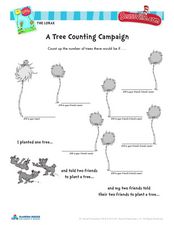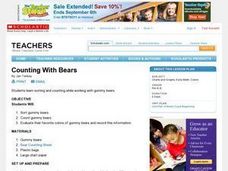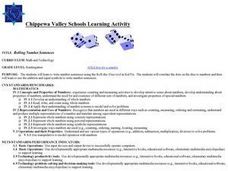Curated OER
Counting in Tens, Beginning with 70
Mr. Mouse instructs kids to fill in the blanks by counting 10's. They skip count by 10s to finish each of the 6 number lines. Learners will count by 10 beginning at 70, 100, 90, 50, 140, and 260.
Curated OER
Counting Numbers
Before you can add, you need to know how to count. Practice counting with your kinder class. Each slide shows bundles of sticks, after they count the bundles, progress the slide to revile the correct answer. This is a great way to...
Curated OER
Counting and Writing Numbers 1-20
Learners connect quantity with numbers from 1 to 20 in this 2-part exercise. First they count the number of circles in a row and write the appropriate numeral from 1 to 10. In the second part, they count objects from 11-20. To extend:...
Curated OER
Counting Forward
Practice counting on from a number using these three sequence starters. Arranged in order of increasing difficulty, the first sequence begins at 5 and has learners add 9 numbers. The answers are written below each sequence, so they...
Curated OER
A Tree Counting Campaign
Review math concepts using this resource. Learners count the number of trees there would be if everyone planted one. In order to complete this activity, learners fill in the names of their classmates and add up the number of trees. This...
Curated OER
Building Numbers to 50
Young scholars explore how to represent numbers using cubes and draw them accordingly. They discuss place value and the base ten number system using manipulatives. Students roll a dice and take that many blocks. They write down their...
Curated OER
Multiply With 10: Homework 19.3
Second and third graders solve three problems in which ten is multiplied by a number. Pupils may use the picture clues to skip count by 10s.
Curated OER
Math Series: Number Patterns
The focus of this math lesson plan is representing numbers in different ways. Young mathematicians practice putting numbers into sets, and arriving at answers in new ways. For example, they are asked to, "Show me how to get 7 eyes." A...
Curated OER
Bunnie Education: 1-10 Worksheet
For this elementary math worksheet, 1st graders practice adding simple numbers in order to practice counting up to the value of ten. This is done in ten problems.
Curated OER
Sorting and Counting Geometric Shapes
Practice counting, tallying, and sorting shapes with this math challenge. Scholars examine a group of shapes, tallying the amount in four categories: quadrilaterals, parallelograms, rectangles, and squares. Then, they color in any shapes...
Curated OER
Take Whole Tens: Subtraction with a Number Line
A tens number line helps your class understand how to "hop" backward to subtract by 10's. Ten practice equations are expressed as math sentences (in word form) using the expressions "take __ from __" and "subtract." A little cartoon...
Curated OER
Let's Count!
Budding counters examine two sets of numbers on this pair of worksheets- one is 0-9, and the other 10-19. They write them in spaces provided, being careful to keep them in order. The numbers are already written out in...
Curated OER
Zero is Our Hero
Students use construction paper to make a set of folding cards that initially hide a zero and then open to reveal a new number. They put their cards into sequential order and recognize numbers as they count by ten.
Curated OER
Mentally Add and Subtract 10 or 100
Find the missing digits in these number sequences. Each of the ten has one missing number and scholars must figure out what it is. Here's the pattern: all of these sequences involve counting by 10s. Learners add or subtract 10 to...
Curated OER
Using Counting-on Strategy for Purchasing
Intended for learners with autism and developmental disabilities, this lesson uses the strategy of counting-on to enhance independent shopping skills. Learners will practice counting on to the next dollar value in order to purchase items...
Curated OER
Race to the Top
Here is a game that will help your young mathematicians practice number recognition and writing numbers. Played with a spinner or dice, individual learners or a pair will play this fun number game. They will roll the die or spin the...
Curated OER
Counting by 2s, part 2
Two, four, six, eight...can your scholars count by twos? They fill in missing numbers in 18 number sequences, all of which require skip counting by twos. Some begin on an even number and others odd, however all of these are whole...
Curated OER
Painting With Math
Students write numbers and create drawings that demonstrate the grouping of objects. They write the numbers 1-10 on their paper, list a different object next to each number, and create an illustration that demonstrates the correct number...
Montana Office of Public Instruction
Native American Culture: Counting, 1:1 Correspondence
Kindergarteners practice showing 1:1 correspondence while incorporating information they learned about a local Native American culture. The objects used for counting are taken from the previous day's Native American lesson plan. The...
Kinder Corner
Counting Cards
Reinforce counting skills with a set of cards that showcase numbers 1–10. Two types of cards are provided—a number card and a card that represents the number with objects.
Curated OER
Counting With Bears
Students sort gummy bears, count gummy bears, and evaluate and record their favorite colors of gummy bears.
EngageNY
Real-World Positive and Negative Numbers and Zero
Class members investigate how positive and negative numbers are useful in the real world. Individuals first read a short passage and identify terms indicating positive and negative numbers. They consider situations involving positive...
Curated OER
Rolling Number Sentences
Budding mathematicians investigate how to write number sentences using the Roll-the-Dice tool in "Kid Pix". They correlate the dots on the dice to numbers and then learn to use the addition and equal symbols to write number sentences....
Computer Science Unplugged
Count the Dots – Binary Numbers
Did you know you can send a message using only zeroes and ones? This interactive resource presents an introduction to binary numbers. Through code cards, pupils learn to convert binary numbers to decimal numbers.























